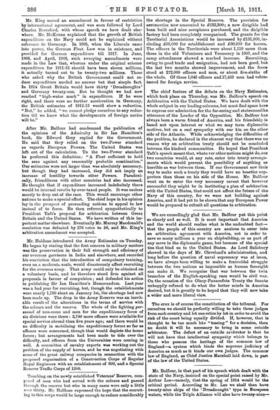Mr. King moved an amendment in favour of restriction by
international agreement, and was soon followed by Lord Charles Beresford, with whose speech we have dealt else- where. Mr. McKenna explained that the growth of British expenditure on the Navy could not be explained without reference to Germany. In 1905, when the Liberals came into power, the German Fleet Law was in existence, and provided for German expenditure till 1917. In June, 1906, and April, 1908, such sweeping amendments were made in the Law that, whereas under the original scheme expenditure for 1911-12 should have been eleven millions, it actually turned out to be twenty-two millions. Those who asked why the British Government could not re- duce expenditure needed no answer but that simple fact. In 1914 Great Britain would have thirty 'Dreadnoughts' and Germany twenty-one. But he thought we had now reached "high-water mark" in expenditure. If he were right, and there were no further acceleration in Germany, the British estimates of 1912-13 would show a reduction. "But," he added, " we cannot pledge ourselves to any reduc- tion till we know what the developments of foreign navies will be."










































 Previous page
Previous page